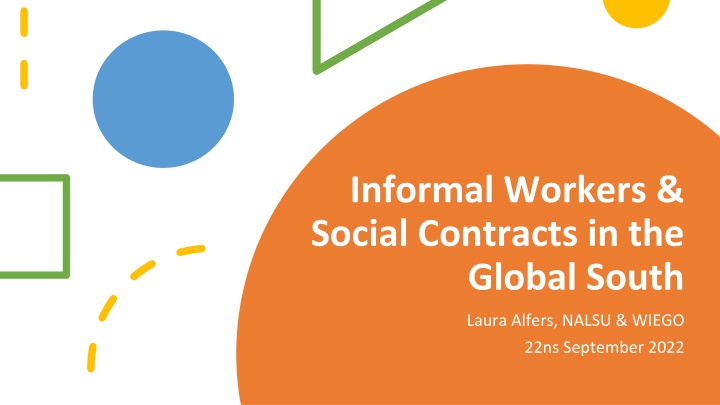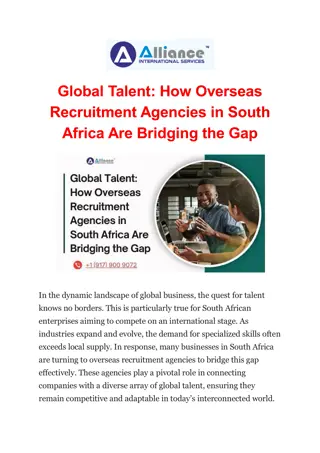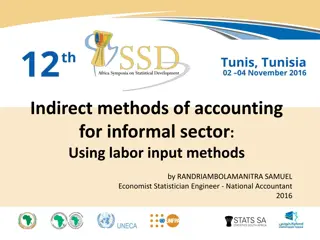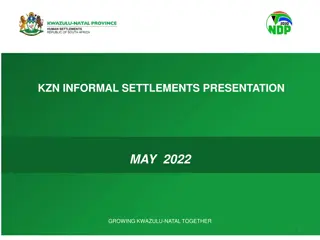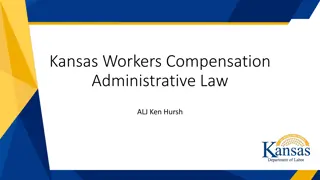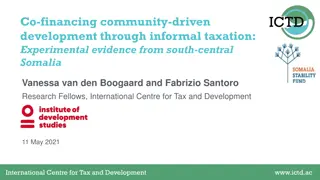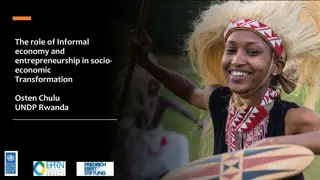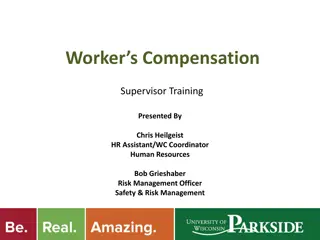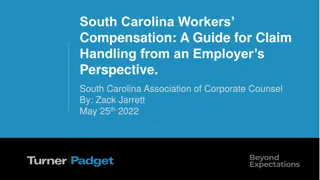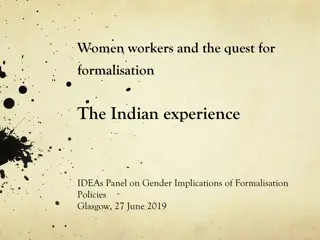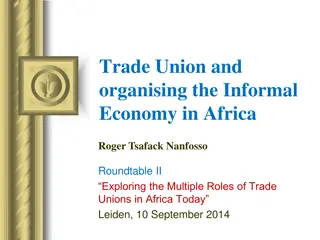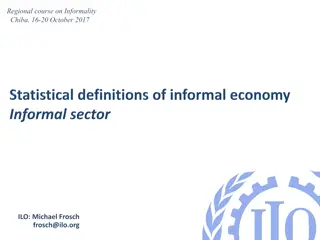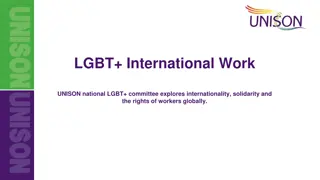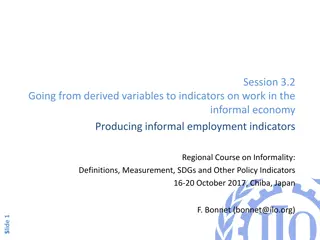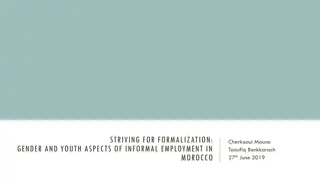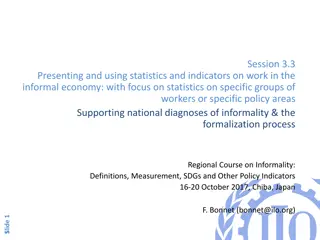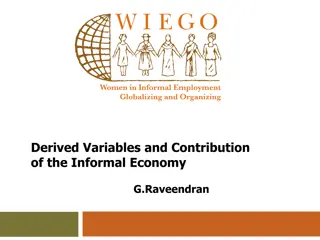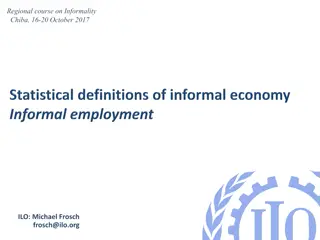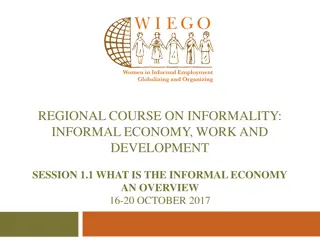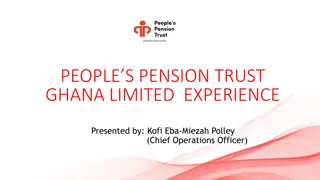Challenges Faced by Informal Workers in the Global South
The presentation by Laura Alfers highlights the plight of informal workers globally who lack labor and social protections. It delves into the concept of social contracts, exploring the evolving nature of these agreements and their impact on informal workers. The discussion also scrutinizes the role of the state, pointing out the adversities informal workers face in their interactions with governmental bodies. The presentation emphasizes the need for a new social contract that includes informal workers and addresses the ambivalence of states towards this marginalized workforce.
Download Presentation

Please find below an Image/Link to download the presentation.
The content on the website is provided AS IS for your information and personal use only. It may not be sold, licensed, or shared on other websites without obtaining consent from the author.If you encounter any issues during the download, it is possible that the publisher has removed the file from their server.
You are allowed to download the files provided on this website for personal or commercial use, subject to the condition that they are used lawfully. All files are the property of their respective owners.
The content on the website is provided AS IS for your information and personal use only. It may not be sold, licensed, or shared on other websites without obtaining consent from the author.
E N D
Presentation Transcript
Informal Workers & Social Contracts in the Global South Laura Alfers, NALSU & WIEGO 22ns September 2022
Workers without labour and social protections provided through work. Make up over 60% of workers globally (ILO, 2018). Heterogenous: Informal wage workers (in formal & informal sectors) Informal wage workers in households Self-employed workers Who are Informal Workers?
An explicit or implicit agreement between state and citizens defining rights and obligations A central concept in Western political theory for understanding and justifying a society s legal, political and economic structures: Has evolved over time: Classical Modern Critical Contemporary What is a social contract?
Policy slogans: changing nature of work = We need a new social contract Often centred on the extension of social protection to informal workers alone. What does it actually mean? Who are the contractors? What should the substance of the contract be? Can this be informed by the currently existing struggles of workers in the informal economy? Beyond the Domination Contract - what is the ideal contract workers are struggling for? Why this book? Why now?
Emergent Themes
Problematizing the State Within social contract ideas, the state is often seen to be a neutral, benevolent, consistent arbiter for fairness. But for informal workers, their only interaction with the state is often negative, punitive and deeply unfair: Adverse incorporation rather than exclusion from regulation - particularly at local levels of the state. Exclusion from protective arm of the state often setting up a contradiction with job creation priorities. Question: How to emphasize incorporation into positive arm of the state, while reducing negative actions.
Ambivalence of the state towards informal workers exemplified by lockdowns. Some sectors of informal workers (food, care work) designated essential by govts during lockdowns. Provided with no support to carry out work safely vast majority of workers surveyed paying for their own health and safety equipment. Punitive actions continue and even increase. Other sectors locked down, but private companies allowed to work (waste reclaimers).
Disaggregating the state as guarantor of rights Despite the ambivalence of the state many organizations of informal workers continue to struggle for access to protections through the state. But informal workers come into contact with and strategize around different levels of the state, beyond the national level. Which level of the state is the most immediate concern may differ according to sector/occupation: Domestic work/work in a private home more likely to be regulated by national government. Urban informal workers in public space immediate concern is often with municipal government.
Complex global supply chains - homeworkers not covered by national labour laws. Analyses EU legislative framework seeking to hold global corps to account for labour violations in host countries. Argues for the advantages of a transnational social contract operationalized through human rights law.
Bringing capital back in Self-employed informal workers make up 44% of all workers globally, and over 70% of workers in low-income countries. With such high self-employment, is there even a role for capital in a new social contract for informal workers? Some argue no Global debates over social protection exemplify this. We argue: Self-employed have a relationship with capital buyers, distributors, suppliers, contractors. Do not underplay the importance of economic power those who own and manage capital have significant political power, and may continue to set unfair terms of engagement outside of employment relationships. A discussion of social contracts which focuses only on the state and neglects economic power is an incomplete discussion.
Extended Producer Responsibility (EPR) manufacturers are responsible for end life of their products. Establishes a link to corporations for waste reclaimers who do the work of recycling. But often designed with an environmental, not worker, lens. Threats formalization and exclusion. Opportunities creating a pathway for protections? In 2021 GlobalRec release recommendations for integration of informal workers into EPR, including financing of worker protections.
Platformization of work often discussed in terms of erosion of worker rights. Disruption of existing informal sectors domestic work. Creating new risks. SEWA Homecare are experimenting with platform co- operativsm to increase worker control.
New statistical category designed to clarify blurry boundary between self- employed and employed. Will cover those dependent on a single economic entity for income. In the long term will generate legal and policy debates upgrade/downgrade of worker rights?
The social contract is a process The social contract is not a static entity it is a shifting process of challenge and negotiation (Hickey 2011). Understood as a process - brings to the fore the question of power: Who holds the power to shape the terms of engagement in such processes? Who gets a seat at the table?
Focus on social protection to understand where and how informal workers are getting a seat at the table with government to expand protections. Draws on Webster et al s use of PRA to analyse case studies: Institutional power Social power Associational power
Formalization? Formalizing the informal economy as a policy goal . What type of formalization are we talking about? Compliance with formal rules and regulations that are not well suited to the economic realities of workers in the informal economy? More bottom-up process tailored to specific needs and realities of workers in the informal economy, with a focus on protection as well as compliance? Investments in inclusive macro-economic and social policy to allow for structural change a future of decent work?
Focus on the type of formalization which is often the go to quick solution taxation of the IE. Drawing on data from Ghana, critique of the new fiscal sociology that taxation is the key to the social contract. Also pointing out that the idea promoted by IFIs that the informal sector is a goldmine does not fit the reality falling below tax net and already highly taxed .
Where to from here? Three Scenarios
The Bad Old Contract Key Challenges: lack of legal and economic recognition stigmatization and penalization lack of institutionalized space for collective representation Key Drivers: political economy biased towards powerful economic actors + negative narratives about the informal economy, including: informal work is an abnormality YET 61% of all workers are informal informal workers seek to evade taxes and regulations YET informal workers are subject to range of fees, licenses and market levies and pay VAT on their supplies/stock + regulations tend to be cumbersome or irrelevant informal work falls outside the reach of the state YET informal workers inside the punitive arm of the state but outside the protective arm
The Even Worse Contract Mounting evidence of intensification of: predatory capitalism: e.g. lower wages and increased working hours + lack of compensation to garment and other workers for cancelled work orders repressive government measures (in name of economic recovery or public health): e.g. destruction of markets, infrastructure and equipment of street vendors; closure of dump sites and sorting areas of waste pickers regressive solidarity between state and capital: e.g. union busting; regressive policy & regulatory reforms; privatization of public space; privatization of waste management Growing risk of inappropriate application of the social contract ideas: application of unfavourable formalization focused on registration and levying taxes on informal workers/enterprises without incentives and benefits of formalization + without recognizing and valuing the contributions of informal workers dismantling of comprehensive systems of social protection, which include both social assistance and social insurance, in favor of minimalist safety nets and private insurance
A Better New Contract The substance: Recognition of informal workers as workers and as legitimate economic agents + valuation of their contributions to households, society and the economy; Appropriate and fair laws and policies responsive to the needs of informal workers Inclusive spaces for dialogue between organizations of informal workers and other stakeholders Necessary actors Necessary processes Necessary changes
